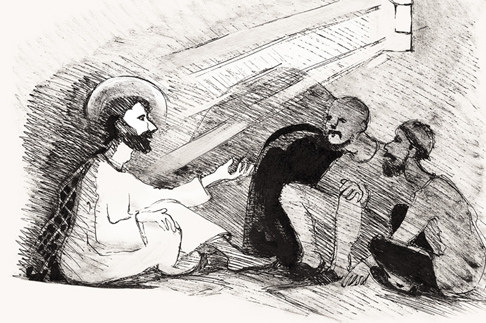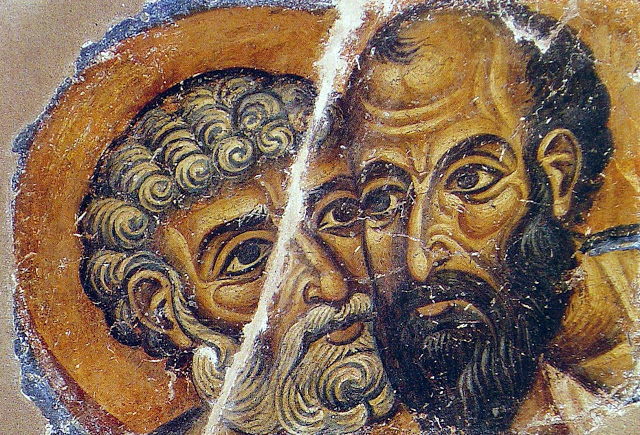
All Orthodox Christians know Saint Ephrem the Syrian as an outstanding ascetic and one of the most authoritative interpreters of the Holy Scriptures in the Church. Contemporaries called him as much as the prophet of Syria. However, the life of the saint did not immediately go along a straight road. In his youth, he had a hot-blooded temper and sometimes was on the verge of a real crime. The saint subsequently said the reason for that was his disbelief in the good Providence of God, which controls all happenings in the world. The conviction that everything in life happens by chance, almost ruined the future ascetic, but the Lord showed him the action of His Providence, albeit in a very unusual way.
Once Ephrem went on a journey, although it would be more accurate to say – to wander, because he had no specific goal. On the way, he spent the night in a field with a hospitable shepherd, they drank wine together and fell asleep. At night, the wolves attacked the flock and stole the sheep. The next morning, the owners of the flock accused the stranger of a steal and dragged him to the judge. Presenting to the judge, Ephraim tried to explain how everything happened in reality. Following him, a man was brought to court, caught in adultery with one woman who ran away and hid. The judge, postponing the investigation of the case, sent both defendants to jail. There was also a peasant arrested for the murder. But just as Ephrem was not a stealer of sheep, so the one brought with Ephrem was not an adulterer, and the farmer was not a murderer.
On the eighth day of his arrest, someone appeared to Ephrem in a dream and said: “Be pious, and you will understand Providence. Think over what you have thought and done in your life. Then you will be convinced by your own example that the people arrested with you are suffering now not unfairly, although they are innocent of the crimes that they are charged with”.
Upon awakening, Ephrem began to think over the vision and seek his misconduct in the memory. Suddenly he remembered that when he was at this village before, he drove out a poor man’s cow from a pen on a field in the middle of the night just for fun. The cow was pregnant and became too exhausted because of the cold. In the field it was overtaken by a beast and torn to pieces.

Shocked by the picture of God’s Providence revealed to him, Ephrem immediately told the rest of the prisoners about his dream and forgotten guilt. The story made a strong impression on them, and they also began to recall: the peasant saw a man drowning in the river, and although he could help him, he did not; and the city dweller joined the accusers of a widow, who was unfairly maligned; accusing her of adultery, her brothers deprived her of her father’s inheritance, giving her part to him for perjury in court.
Saint Ephrem describes his impressions of this confession of his fellow sufferers: “Upon listening to those stories, I began to lament; because there was some obvious requital. And if I were alone then, I would probably say, that everything happened to me just in human way. But the same thing happened to all of us. …Upon falling asleep another time, I saw the same person saying to me: «tomorrow you will see those for whom you bear resentment, and liberation from the slander that has been put on you»”.
Further, it has turned out so, that the true perpetrators of the crimes, for which Ephrem’s neighbors languished in jail, were “accidentally” brought to court for completely different reasons. In the course of the trial, the judge found out the truth and their previously hidden guilt. In addition to this, before Ephrem’s case was considered, a new judge was also “accidentally” appointed, who “accidentally” turned out to be from the places that young Ephrem left to wander. Moreover, this new judge “accidentally” turned out to be a good acquaintance of Ephrem’s parents, he was in their house and remembered him as a child. This story ended with the fact that the innocent were released from the jail, and the perpetrators were punished. And Ephrem himself, after almost seventy days in jail, believed for the rest of his life that there were no accidents in life, and every sin committed had its requital.
This is how the life of one who is now known to all Orthodox Christians in the world as Saint Ephrem of Nisibis, the Syrian prophet, began.
Translated by The Catalogue of Good Deeds
Source: https://foma.ru/prepodobnyij-efrem-sirin.html




Nice story, but not the historical Ephrem of Nisibis. This is Pseudo-Ephrem according to later Greek stories attributed to Ephrem.
Joshua Falconer, what do you think Of the question? And why did the pseudo saint compose his answer to it?